The Evolution of Accessible Super Heroes

The draw to comic books is as diverse and fascinating as the super heroes that inhabit the pages. We all have our own reasons for our fan-boy loyalty of certain super heroes. The Incredible Hulk has captivated me since the very first time I picked up his comic book. He was big, he was mean and he was a sensitive love-stricken protector of the innocents. Those characteristics should never change. Yes, we all enjoyed Mr. Fixit but how gratifying was it when the Big Green Monster came back? We like our super heroes consistent. It is an age-old adage, if it ain’t broke, don’t fix it. Remember when Coca-Cola brought out New Coke? How about the debacle of Clear Pepsi? I hope we all still cringe when we think of Superman Red and Superman Blue. The comic book industry loves to re-launch and redesign their properties. However, at the core, the characters rarely change. Many changes are cosmetic and necessary to keep the look of the character current. When is it acceptable for a hero to change and make him/her more accessible to the readers?
Learning Confidence From Peter Parker
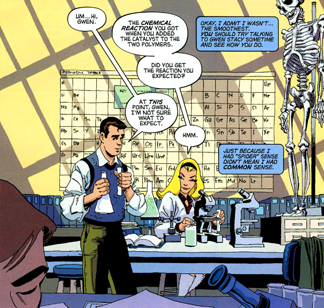
from Spider-Man: Blue by Jeph Loeb and Tim Sale
Marvel Comic, 2002-2003
A largely underrepresented change that does not happen in comic books is growing up. Not just growing up as in aging but gaining real responsibilities; getting married, having children, getting a divorce, losing your job or home. As comic fans grow up and get older, our heroes do not experience many of the issues that surround our life. Other than Spider-Man, we have very few heroes who we have seen grow up, albeit not mature, but grow up. Peter Parker has fallen in and out of love. He has graduated high school, gone to college and worked a real job. Peter dated, broke up and married MJ and has become a more relatable super hero because of it.
When Peter Parker was in high school many readers had an immediate connection with the stereotypical nerdy science kid. Getting bullied and ignored by girls was all too real for many of us. Of course becoming a super hero is not going to happen to any of his readers, however gaining confidence can. As Peter Parker became more confident (as Spider-Man) he opened up and became a more dynamic character. His relationships evolved and he grew up. Soon he was able to talk to the pretty blonde in class and surprisingly she talked back to him. This gave all of Spider-Man’s readers hope. Hope that their lives could get better and they would eventually get to have a real conversation with a pretty girl.
Batman Looks Like My Grandpa
We cannot discuss a superhero growing up without referring to Frank Miller’s The Dark Knight Returns from 1986. A seminal read for all comic fans, but was Batman a more accessible character at his advanced age? Now that Batman looked mortal, did it help him relate to readers? I’d argue that we were given a logical depiction of what will happen to Batman if he aged as the rest of us do. He didn’t evolve as a character, he got old. Bruce Wayne did not go broke. He didn’t lose Wayne Manor and the Batmobile wasn’t repossessed. Batman remained true to his core and although his body began to break down, his spirit and resources were never stronger.

Frank Miller, Klaus Janson & Lynne Varley
DC Comics, 1986
Batman was born of a such a tragic origin that comic readers did not need any further explanation into why Bruce Wayne became Batman. It is horrific to think of losing one’s parents. We accepted Batman for who he was from day one, year one. He is a hero that we may relate to in an all to real way. We want him to succeed against all odds. Whenever we find Batman in an unbelievable or ridiculous adventure like The Return of Bruce Wayne, we return to that infamous night in Crime Alley and know that Bruce Wayne has suffered as many of us have. Perhaps Batman is the exception. We root for him because he is like us. He has no super powers but through dramatic adversity has become a true super hero to the average reader.
Sweet Christmas! Luke Cage is a Daddy!
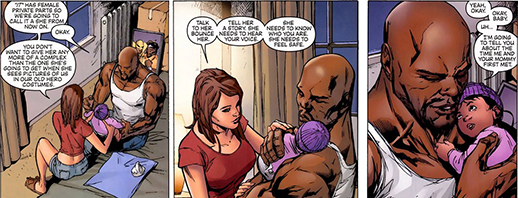
Brian Michael Bendis & Billy Tan
Marvel Comics, 2009
Comic books spoil us. Even when our heroes are at their worst or have hit rock bottom they are an idealized version of themselves. Our heroes do not age. Our heroes rarely die. They are perpetually fighting super villains in their prime and will always triumph. That is why we love them and continue to read their books. Very few of our comic heroes have events happen to them that we can relate to. A radioactive spider never bit me. As far as I know I was not rocketed here from an exploding planet and I have to keep a real job.
One hero that I have always loved is Luke Cage, Power Man. The original Hero for Hire was everything I looked for in a comic. He was a no-nonsense badass who fought for the little guy. Luke Cage has suffered for years for being a product of the 70’s. At his worst he was a stereotypical Blaxploitation action star with a disco wrapping. It took a while for Marvel to redesign Power Man into the Luke Cage we know today. Ditching the retro costume was necessary for us to take Cage seriously as an alpha hero in the Marvel Universe. The moniker Power Man also needed attention. It is unlikely that a tough guy from Harlem would be respected calling himself Power Man. Cosmetic changes complete, Cage did not need a secondary mutation or cyborg enhancements – he just needed readers to relate to him.
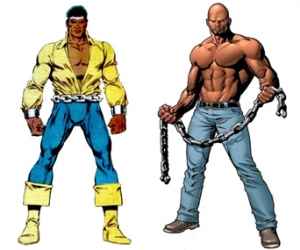
Growing up on the streets of Harlem and imprisoned for a crime he did not commit, Lucas Cage was given a second chance at life. After obtaining unbreakable skin via a jailhouse science experiment, Cage became our Hero For Hire and decided he would clean up the streets one criminal at a time. Arbitrary origin story aside, Power Man had a great run in the bronze and modern age of comics. Luke Cage did not begin to develop depth as a character until he fell in love and married Jessica Jones. With the birth of his daughter, he is now beginning to reach his potential as a hero. Luke Cage is now accessible. The hardened former hero for hire is now a family man. Cage went underground during Marvel’s Civil War and decided to have his wife and newborn leave New York. Cage finally had something tangible to fight for. No longer was he defending the little guy but fighting for a better world. A world he could raise his daughter in. A world he could be proud to say he helped save. Luke Cage has now become the hero of an aging comic book fan base.
Those of us that grew up loving Heroes for Hire and Power Man and Iron Fist’s swift and deliberate brand of justice now have a hero for our generation that has similar problems to us. Luke Cage struggles to fight The Wrecking Crew but also has to change diapers. For every battle with a super villain he also argues with his wife. Like it or not Power Man has grown up and his greatest battles are ahead of him. These battles will not come in the form of another Skrull Invasion or The Masters Of Evil but in the greatest adventure many of us can relate to, fatherhood.
Within the super hero genre of comic books we have years and years of continuity and stories to process. As a kid growing up reading these comics it is exciting to uncover super hero team ups and new villains in the back issue boxes. There was no greater joy for me than digging through long boxes and finding an obscure story from my favorite titles. As I got older, the harsh reality of growing out of comic books began to set in. I had a brief hiatus from comics in the 90’s only to return when Marvel’s Ultimate Comics debuted. The heroes updated and relaunched in today’s world. Amazing. I had a renewed interest in comic books and it was solely because I could relate to my heroes again.
An adult reader of comic books may need a little more reality in our heroes. When our heroes grow up and gain responsibilities it feels more realistic. These heroes do have something substantial to fight for. Peter Parker has loved, lost and failed in every facet of his life but he continues to press on. It would be acceptable to allow him to falter in life but his confidence allows him to persevere. Bruce Wayne has everything a man can ever want but has suffered the greatest tragedy any of us could have faced as a child. His origin is so unforgiving that we all root for his success even if we are jealous of his wealth. Luke Cage floundered for years as a stereotypical brute and when he found love with Jessica Jones and was lucky enough to have a daughter his hero status skyrocketed. These heroes grew up. They made life decisions that we as readers can relate to.
The aging population of comic fans have found new dynamics in our childhood heroes that we thought were lost. These added responsibilities and problems create a bridge of accessibility to some of our favorite super heroes. Who doesn’t want to read the issue when Danielle Cage grows up and brings her first boyfriend home to meet her father – Power Man? I feel privileged to join Luke Cage on this journey through marriage and fatherhood. I applaud Marvel Comics for their efforts to bring him to the forefront of their universe and hope that they continue to allow their heroes to mature. Many aging comic fans don’t want to grow up but it is welcoming to know we have our own heroes to team up with to help us navigate this story arc of life.
What do you think? Leave a comment.
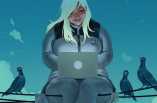
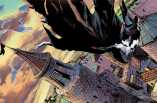

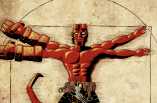
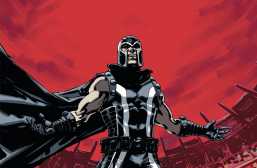
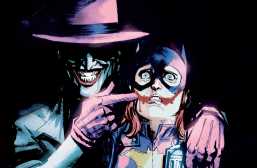
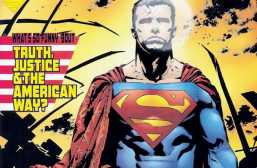
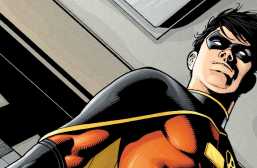
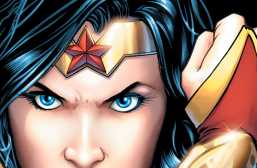
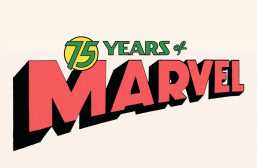
Speaking of married superheroes (who’ve been an endangered species since Sue Dibny was killed off), I have to recommend Thom Zahler’s underappreciated (and probably underseen) “Love and Capes”. It’s a superhero relationship sitcom, that’s thus far been following the meet-cute, engagement, and marriage of a Supermanesque hero to a bookstore owner.
It was a breath of fresh air because unlike so many superhero stories today, it’s light and fun and not reliant on bigger bangs or gratuitous tragedies– something I’ve missed since the days when the Giffen and DeMatteis JLI was still a going concern. (Nor, like too many sitcoms, does it fall back on the standby of making one of the members of the couple horribly unlikeable to drive the story.)
I had to special order it from my comics store, which doesn’t say much about the distribution. But these days there’s at least one collection on Amazon, and a webcomic on the author’s site.
I remember hearing about Love and Capes but I have never seen it. If I remember correctly it was attempting to adapt/capitalize on “My Super Ex-Girlfriend”.
If we are looking for a Superhero becoming an adult, we can look at Hellboy. Del Toro really did a good job with his adaptations of Hellboy, taking an essnetially 80 year old teen and putting him through a series of events. These events force Hellboy to look at himself and make him WANT to mature.
Hellboy was a tough omission for me. I wanted to try and stay focused on traditional super hero books.
Hellboy would be a good study of relationships in general.
I believe some works (Moore’s Utopia, Gulliver’s Travels, and others) manages to be mature without being grounded in reality. While most superhero books are not philosophical lessons or biting satire, they at least, can pose a very reasonable, relevant, and sincere question about our human condition–what else can one ask from adult and intellectual literature.
Agreed. Well said.
Superheroes aren’t real. Besides, plenty of marriages in the real world collapse because of the demands of a career. That is, one chooses the career over home life. There’s no way a superhero marriage would last “in the real world”, because the job would get in the way.
Also pretty much every married guy I know (myself included) has a pretty boring life. It’s beautiful and full of love, but excitement comes from time spent doing romantic stuff together, or game night with other couples. Throw kids into the equation and the highlight of the week is a trip to the farmer’s market on Sunday morning. Naah, I don’t need my superheroes to be married, me being married is enough.
I am not saying I need all my super heroes to be married. I am fine with a handful married supers. I do like my comics to have just a bit of reality in there so I feel like I have something to hold on to.
I enjoy where Bendis and others have taken Cage over the past few years and I think his marriage and child are now the driving force of his heroic career rather than just fighting injustice or standing up for the common man.
Seeing a big tough guy also be a good dad is another positive influence for young readers.
A married comic book hero: the Phantom. That is if he qualifies, as I am only familiar with the newspaper-published strip (and I haven’t seen it in some years now). Anyway, he did marry his girlfriend, who was a fairly strong willed and active woman (she worked for the UN and could hold her own against villains), and they stayed married without a lot of problems for years. They even had kids and were raising the next generation’s Phantom last I knew.
American comics are long-running copyrights means that there’s only one source for certain characters, and that is not quite how shared stories have been written. I’m wondering if kids in ancient Greek villages complained if Zeus got more powers in one story versus another and decided, I’m not telling my kid any Zeus stories ever.
This discussion about superhero comics not growing up doesn’t feel like a test we give other arts–if you love U2 or whoever, do you give your kid the new album you haven’t listened to yet hoping they like it? Or do you hand them an older one? I mean, certainly people do, but U2 or whoever suddenly sucking feels like less of a betrayal in their context.
I say all this from the heart as a long tenured fan who both wants more mature stories and remembers why continuity as a reader is so exciting. I’d hazard to guess that yeah, superhero comic writers have the same limitations as entertainment writers in other fields, but the greater peril isn’t in lack of imagination about the stories they can tell, but just simply the desire to recreate what got them their in the first place, and it reminds me how differently I feel about Lord of the Rings vs Harry Potter. The former I loved in first read and as I’ve grown older and my tastes change, I see things I don’t like. But it’s done, and I can revisit it and it’s not tested–maybe if I was a big enough fan of a setting that is revisited, Dune or whatever it’d be different. The latter, I read it and liked it but also had trouble with parts that got more frustrating as the series went on. But LOTR I swallowed in a gulp and Harry Potter I read more or less as they came out, aging and changing along with it. Likewise, reading a Spider-Man comic now is also a gamble at, are they trying to recreate the story I read, warts and all and I’ll compartmentalize my desires and like it? Are they trying to appeal to me in a new way entirely? Half-half (the worst possible I think)?
Great analogies Joey.
Writers are typically handcuffed by their editors and more so by the publishers themselves. This article started as an homage to Luke Cage and evolved into more of a study in how some heroes mature and become stronger while others never change.
You mentioned the “C” word…continuity. There is nothing I hate more than publishers wiping years and years of history from their books. I love the Ultimate Marvel line and I dislike DC’s new 52. There are some new 52 titles I really enjoy but I don’t think it was necessary for a complete relaunch.
The “C” word is a double-edged sword in the creation of accessible super heroes. By building continuity, readers get to see a character naturally develop and mature (i.e. Peter Parker growing from an insecure high-school student to a slightly more secure college student). Continuity builds a coherent story, but the problem is the same story cannot last forever without losing it’s essence and verisimilitude. Batman went from fighting thugs and criminals to “shooting” intergalactic gods and travelling through time. That’s the danger of continuity: if stories don’t properly come to an end, then they will lose their coherency. That’s why reboots have to come into play. I liked the Ultimate Marvel line, too (especially Ultimate Spiderman) and I kind of like The New 52. I can see where the relaunch was necessary, but I don’t like the new personas of some of the characters.
Continuity is an enormous hurdle. It needs to be either fully embraced or completely ignored.
Imagine you’re a new comic reader and you want to start reading X-Men. Where do you start? Which team? Should you buy back issues? Should you buy trades? Where do the movies tie in?
I’m glad this article may have sparked in some a question, as you put it, when should stories come to an end.?
I really like what you say about Luke Cage being a dad. I’m glad that your article focuses on the good in comic books instead of just citing all the bad stuff. I’m always cautious about saying what art “should be,” especially in terms of inclusiveness (especially in games, a really sensitive subject), but you’ve captured something really positive here, and moral, too.
Keep up the great writing!
Thanks Nilson. I appreciate the support.
I wanted to stay positive in the article. I’m glad it came through that way. And thank you for your editing.
No offense to any superhero fans out there, but it seems to me that going to superhero comics to see realistic adult depictions of adult relationships is ridiculous. The genre is inherently juvenile. It’s about costumed, super-powered beings who hit each other. Not fertile ground to deal with the ins and outs of modern marriage and relationships, no?
That’s quite a reductive statement you have going on there. I’m not going to say that there aren’t pulpy comics that are simply about the action and the punching, but just because a genre contains certain elements doesn’t mean it’s solely about them. The elements help explore human stories and push them further. The Walking Dead, for example, isn’t just about killing zombies. It’s about human interaction in the face of extraordinary circumstances (in this case, a mysterious pathogen). So why can’t superhero comics do the same? The genre couldn’t possibly have persisted this long if it was solely evolving by having new beings hit each other in new places. Look at how Watchmen comments on the notion of humans believing they are invulnerable. Or for something less deconstructionist, look at how the X-Men comics tackle issues of civil rights. It’s only a juvenile genre if you choose to view it that way. That’s perfectly fine but I believe superheroes are a perfectly rich medium for exploring subjects like adult relationships.
Well said Max.
By the way, I enjoyed your article on Identity in Dollhouse and Orphan Black
Thanks! I really appreciate it 🙂
Perfectly said! The idea that a superhero comic by it’s very nature has to be juvenile is a pretty easily dispelled one, considering the works that have come out since the early 1980s – and some of them even before that. I’d recommend adding to your list another Alan Moore work, Miracleman, which showcases (amongst other things) the danger and fearsome nature of a superhero if one was to actually exist in real life, but that’s just because of my own personal love of the series.
Thanks Sean-
Miracleman (Alan Moore’s Miracleman) is an amazing book. I tried to stay mainstream just as an introduction to this as a topic. I will certainly have more academic studies of comics in the future. Thanks for the comment.
Look at Ultimate Spider-Man. It screams kid comic, however there are stretches of that series where not one punch is thrown. There are issues dedicated to one conversation that Peter struggles to get through. A great way to get kids talking and thinking about life is by not forcing them to. Bendis does a great job of this in all of his books on varying levels.
If super hero comics were all the same then the industry would die out. Not everyone enjoys Luke Cage. I do because of the now complex relationships in his life.
I am not preaching that all super heroes need to settle down and get married, I am merely commending those writers that have taken that gamble with characters.
Nice piece! I always think I’m going to stop reading comics, but then new writers and artists keep grabbing characters that I like and doing something fresh and interesting with them. The recent run of Indestructible Hulk featured a fascinating evolution of Bruce Banner where he no longer struggled against his alter ego but accepted the Hulk as part of himself. He made a deal with SHIELD that gave him a lab, a group of lab assistants, and the ability to do research and development into technology that could be used for the betterment of humankind. In return, SHIELD got to use the Hulk whenever they needed him. It was a short run, and the book is already getting relaunched again, but it was a cool premise and a welcome maturation of Banner’s character.
Hulk Breaks. Banner Builds.
I enjoyed that series. I thought it was a great direction to take both Hulk and Bruce Banner.
This is a really interesting, cool topic. I’ve never really thought about this sort of thing. Great insight and a great read! Thank you~
Thank you.
I appreciate your comments.
The ability to change — or not — is not merely dictated by the genre, it is something that must be addressed by all serialized story-tellers. Comics have the luxury, which they cheerfully exploit, of re-setting timelines on the regular. (Year Zero, et al.) But there is also a accepted convention, though getting less and less popular, of allowing a new writer/artist to step in and hand-wave away years of canon and start fresh for little or no reason. Not necessarily a bad thing, though it can be if the publishers disregard the needs of older, long-term fans.
But comics aren’t the only serialized story-telling medium. Supernatural is a prime example of a continued attempt to both emperil and test protagonists, while keeping them essentially the same, and essentially relatable even though their lives are nothing most of us can relate to. Jim Butcher’s Harry Dresden series is another — with each book, Harry steps a little further from his original mold, and becomes a little less like someone I know and would have a beer with.
Interesting. I like the comparison with Supernatural.
Great point as well with the hand-wave by certain writers that is accepted. I hope that lessens in the industry but it does not look like it will stop anytime soon.
I wonder if part of this rest on a couple of peculiarities of the superhero genre of the comic book medium. The first is that superheroes in comic books generally don’t age, and when they do they rarely age at anything like the same pace as the readers (one exception is John Constentine, who–last I knew–ages at a rate of pretty close to one year of comic book time per year of real world time). The other is that comic books aren’t so much serials as open-ended stories told on a schedule and, over time, by different writers.
There’s not a clean relationship between age and maturity, but it seems to me that maturity comes from facing different problems over time, and applying experience to the new ones when possible. And some problems can only come about as people age. My reasonably mature 30-year-old self didn’t have a child in elementary school, for instance. Am I more mature now for facing the problems of raising a child thus far? (I think so…)
Maturity also, I think, relies on a certain kind of continuity. Not just the continuity I like to geek out on with respect to comic books, but also a continuity of my identity. I couldn’t be as mature as I am now if I don’t remember my previous challenges and how/that I overcame them. So with a superhero title. Major events certainly get carried forward from writer to writer, but the subtleties of character development and maturity might not be in the transitions from writers 1 through 6. Add to this the fact that (typically in the mainstream, anyway) comic books aren’t self-contained author-driven tales like novels are (owned by publishers who use the characters as properties to maximize profits, and they exist within the potential for cross-over stories), and there are just a lot of cooks working on that broth.
I agree. A new writer every arc is a pet peeve of mine. I love when a company sticks with a creative team for extended runs.
It’s been a pet peeve of mine to see characters that remained unchanged. Characters I love I might add. I loved seeing an aged Batman. It felt like we were finally given a fully realized human being instead of a portrait of a guy frozen in time.
And I LOVE that Luke Cage is married with a child. The family unit is constantly being chopped off at the knees by writers for the purpose of angst. I’ts about time we were treated with a happy family.
Couldn’t agree more.
Great read. I didn’t like it when they married Peter and MJ, or when they married Clark Kent and Lois Lane, for that matter. Or when they brought back Ma and Pa Kent during the 1980s Superman reboot. I don’t like that Batman has a son, even though I’m enjoying those stories. Not because I don’t like marriage or living parents or children, but because I knew at the time that they would at some point want to change up the status quo again, but there’s no good way to walk that back.
I didn’t like Damian Wayne as a concept when I first heard of it but I do enjoy those stories as well and he has grown on me…..like most kids I guess.
Good article! This is why shows like Arrow and Smallville worked well. We get to see the heroes face every day life as well as who they are. They face the same situations as every day people and move forward after their encounters with them.
Excellent point.
Thanks.
My go-to comic book character when it comes to accessibility and growing up is Dick “Robin/Nightwing/Batman” Grayson.
Talk about growing up!
Depending on the continuity or reboot, he’s been a crimefighter and staunch ally of Batman since before high school.
And in the many decades since his premiere we’ve watched him mature, grow, and in a lot of ways outshine not only the sidekick stereotype he helped create but his own mentor as well.
Dick grew up in Batman’s shadow but always in the spotlight. As Robin, he was the premiere young hero in comics and the DCU itself. Nearly as capable as Batman from a young age, he commanded respect and admiration. His natural talents and overall great personality helped him shine in this way.
In the process of growing up many writers also explored Dick’s response to growing up in a dank, dark cave, running around and throwing boomerangs at poor people at the Batman’s side.
At times he loves it. At times he resents Bruce. Other times he’s drowning in responsibility. There’s a real complexity there.
Arguably the most “normal” guy in the Bat Family next to Alfred, it has been a real joy to what the character’s evolution and his ability to remain relevant and accessible after all of these years.
For a lot of kids, the idea of being Batman is an alien one. But Robin? DC has proven that any kid (so long as he has black hair, blue eyes, and an idea north of 160) can be Robin and hang out with the Dark Knight.
Fantastic. I love Dick Grayson. He is certainly the best example of a character aging and evolving into something more without drastic comic relaunches or continuity shifts. He has grown up in as close to real time that Comic books have.
Could be a great study subject for a follow up to this article. Thanks.
You say traditional heros are less oriented toward the matured audience, once enthralled by the high action, now needing more relatable content. You’re right, so instead of looking to the big name companies to continue using a template for all the classic suited icons, investigate more independent sources that redefine what a hero really is. An example, in Sweet Tooth (a graphically intense, emotionally orchestrated, Vertigo comic) the ‘heros’ are a group of genetically rejected children and the repented adults that care for them. The social commentary within, and quality of overall project, is as stimulating to me as any action scene would have been for my younger self.
Sweet Tooth is intriguing. I’m not sure if I am completely hooked on it yet, but we’ll see. I do love Vertigo and they tend to be much more progressive than other imprints/publishers.
As an FYI, I read everything; Marvel, DC, indies, “mature” topics, you name it. I wanted to stick to the big two publishers as an example. These are the characters I loved as a kid and really have not changed a whole lot since, with Cage being the exception.
Still waiting for more Batman related productions, animation or otherwise.
What a neat article–one of the most redeeming traits of comic books is their ability to transform their characters over space and time into whatever scenario is must relevant for its era. Batman, like you mention, has been re-imagined hundreds of times, over different cultures, times, and ages. There’s Batman manga, for example, which was created when Batman was very popular in Japan. That Batman was appropriated for that culture as it changed, and as such is very different from our American Batman. You might also see other examples in films such as Batman: Gotham Knight, for which a popular anime studio (STUDIO4°C) created some shorts.
But I’m rather disappointed to see that all of the heroes discussed here were male; today, with more and more female fans (and the ever-growing public awareness of female superhero objectification) speaking out, I would have thought female hero evolution would be a very rich topic. It would certainly be worth anyone’s time to discuss Ms. Marvel, who today has been recreated as a Pakistani-American woman in order to reflect America’s changing population (and the presence of women of color, and women in general as figures in comics as some people to admire for their traits and personalities rather than their skimpy outfits). The same can be said for Black Widow’s rise in popularity after appearing in The Avengers films. In addition to trade paperbacks, superheroes in television (such as Steven Universe, where of the quartet of heroes, three are women, or Adventure Time’s Fionna, who received an overwhelmingly positive reaction from fans, and especially with the female audience) are reflecting more and more realistic and positive female characters with speaking roles, and who are strong and charismatic and not simply sexy sweet-nothings. As our culture has changed, so has our idea of what female heroes can (and should) be. The more we re-imagine tired old cliches (such as new 52 Starfire *shudder*) the more folks in the comic industry can extend their hand to young women and sincerely say that they are more than sexy plot devices meant to function as eye candy.
–Lindsey
Lindsey-
Great idea to focus on female characters. It was a decision of mine not to include Ms. Marvel because of how she is changing now. I do not have faith that any of the changes will be wiped away after a year. I have been keeping an eye on Carol Danvers rise in status over the past few years and she is very close to where I would put Luke Cage in the hierarchy of the Marvel Universe if not higher. Being the father of 2 daughters, the depiction of women in comics is something I constantly discuss with them. If you’d like maybe we can collaborate on an article on this topic.
I really enjoyed this article’s connection to the human experience and how superheroes are representative of that. When they do not experience and grow as we do, we tend to have a little of a disconnect. On the other hand, they are a way to hold on to a time of innocence.
Love it.
That is the struggle I have, I do not read comics to be reminded of my problems so I do hold on to that “innocence” as you said, however I do want to feel connected to my heroes.
I totally agree that the growth of different characters has been a huge part of what’s enjoyable about modern comics. I would absolutely love to hear your perspective on Superior Spider-Man. A lot of people were upset about Superior starting, and a lot of people are now upset with the direction the story is going in, but I really feel like this was instrumental to the character’s development. We all love our characters the way they are, but it’s true that, after too long, it’s difficult to relate to a character that’s stagnant. The one notable exception I can think of would be Captain America, as Cap is sort of meant to be a hero of days gone by, but otherwise, I think characters usually benefit from that growth. The problem is, it seems, that a lot of writers don’t understand what true growth and development are; instead of making a character more real and grown-up, some writers just kill them off and bring them back over and over or slap a new suit on them. Progress for the sake of progress hurts comics more than just about anything else, and I think that’s why fans are so hesitant to accept any changes to the status quo, even the good ones.
Really excellent article. I hope it makes people think about why and how characters could change for the better.
Thanks Sterken.
I’m glad you enjoyed the article. Superior Spider-Man is a touchy subject for me. I love stories where other heroes pick up the mantle of another to continue their legacy; Dick Grayson/Batman, Iron Fist/Daredevil, US Agent&Winter Soldier/Cap. However I hate the continuity wand wave that happens at the end of many of these types of stories. It will be interesting to see how the end of this chapter plays out.
So, as of now, I have no idea what the long term effects of Superior will have on Spider-Man but I am excited to see where it is headed.
The constant change in superheroes is also to pull new readers in, that’s what the major relaunches are trying to do now. Iron Man essentially stays the same billionaire playboy philanthropist, but his origin got switched to the middle east because its more relevant to today’s readers than Vietnam.
I understand your statement JustNaz9. I think with the popularity of Comic based movies this is happening even more. As much as love seeing these movies, I am hoping that they don’t hurt the comic book medium.
Great article uncle Jamie. I wonder how I will feel about my favorite heros when I’m an adult. Especially Shazam one of my favorite things is being able to connect with Billy cause we are the same age,so I wonder if I will still be able to connect with him in two years.
I loved the article and thought it was on point re: the need for our childhood heroes to grow so us older readers can continue to relate as well for the characters themselves to stay relative. Highlighting the evolution of Luke Cage was an excellent choice to show his maturation over the years.
This touches on a really interesting conundrum; what do writers do to keep characters fresh and interesting without changing their core? You’re absolutely right that for the most part we don’t like change. Often alterations of characters have to be subtle- created on some sort of emotional level. Luke Cage has definitely transformed (thank god) from his 1970’s self. I wonder if I’ll look for more changes like this in comics as I get older and have a family.
Great ideas developed here. I like how you intertwined the evolution of some comic characters with the feelings of identification (aging) readers have with them.